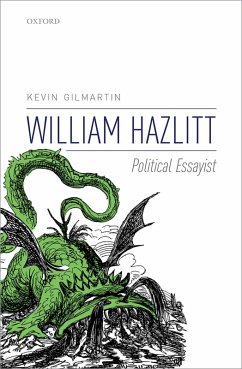Over the course of a literary career that extended from the lingering Malthusian controversies of the late eighteenth century to the brink of the Reform Act of 1832, William Hazlitt produced a remarkable body of committed radical journalism. Against the view that partisan passion undermined his aesthetic judgment and compromised his celebrated disinterestedness, William Hazlitt: Political Essayist restores politics to the center of his achievement as a critic and essayist. In doing so Kevin Gilmartin explores his constructive relationship with the early nineteenth-century popular reform movement, while acknowledging his desire to reflect critically on radical politics and express his own doubts about social progress. Early chapters attend closely to his critical method and matters of style and form, focusing on the political development of his contradictory prose manner. Paradox and inconsistency are central to his attack on 'Legitimacy', a term he drew form the lexicon of post-Napoleonic political journalism. In treating legitimate government as a revived form of divine right monarchy, Hazlitt often produced harrowing visions of the perfect refinement of oppressive power and the complete elimination of any principle of liberty or resistance. At the same time he found ways to preserve his commitment to oppositional political expression and the redemptive necessity of what he termed 'a word uttered against'. Later chapters bring together the spiritual heritage of rational Dissent and emerging democratic developments in London to understand Hazlitt's distinctive mobilization of radical memory as a way of contending with present injustice and envisioning a political future.
Dieser Download kann aus rechtlichen Gründen nur mit Rechnungsadresse in A, B, BG, CY, CZ, D, DK, EW, E, FIN, F, GR, HR, H, IRL, I, LT, L, LR, M, NL, PL, P, R, S, SLO, SK ausgeliefert werden.









